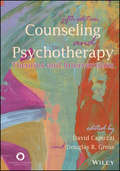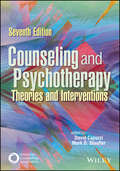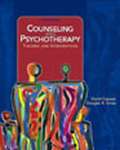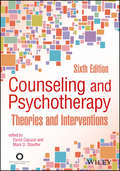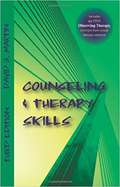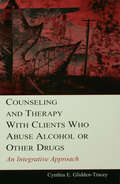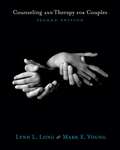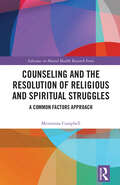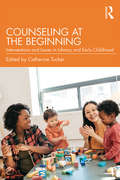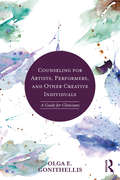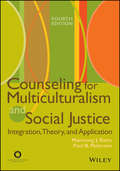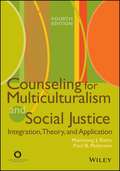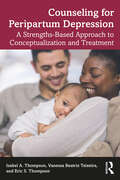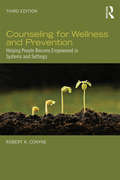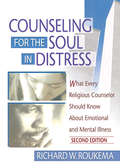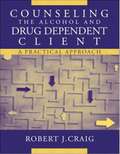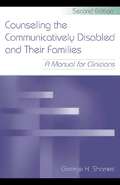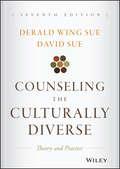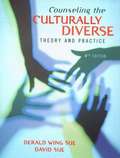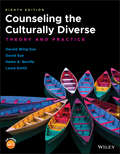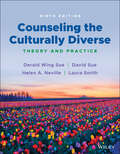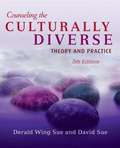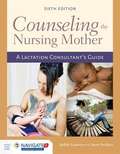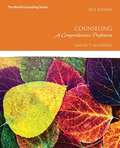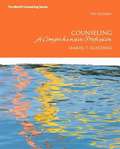- Table View
- List View
Counseling and Psychotherapy: Theories and Interventions
by David Capuzzi Douglas R. GrossThis student-friendly and well designed introductory text provides a thorough overview of 14 widely used theories. Experts examine each theory from the perspective of its historical background, major constructs, goals, cross-cultural considerations, and limitations. Traditional and brief interventions integrate theory with specific counseling strategies, giving students further insight into the counseling process and guidance in developing their personal counseling style. A consistent case study across chapters reinforces the differences between theories and illustrates assessment of client concerns and treatment planning. Introductory chapters explore core dimensions and brief approaches to the helping relationship, and how to best deliver counseling and advocacy services to diverse client groups. A complimentary test manual and PowerPoints for instructors’ use are available by request on university letterhead. *Requests for digital versions from the ACA can be found on wiley.com. *To request print copies, please visit the ACA website here: http://isgweb.counseling.org/ISGweb/Purchase/ProductDetail.aspx?Product_code=78118 *Reproduction requests for material from books published by ACA should be directed to permissions@counseling.org
Counseling and Psychotherapy: Theories and Interventions
by David Capuzzi Mark D. StaufferThis foundational text offers dynamic and fresh perspectives on theories across the helping professions to help guide client case conceptualization and therapeutic transformation. A diverse group of topical experts providees contemporary insight on the following theories: relational-cultural, psychodynamic, Jungian, Adlerian, existential, person-centered, Gestalt, cognitive behavioral, third-wave cognitive behavioral, rational emotive, reality therapy/choice, family, feminist, constructivist, and emotion-focused theories, as well as creative approaches to counseling used in a variety of theoretical models. Each theory is discussed in terms of historical backtround; human nature and development; major constructs; applications, including goals, the process of change, traditional and brief interventions, and serious mental health issues, supporting research and limitations; and the case of Clarita. The use of a consistent case study across chapters reinforces the differences between theories and demonstrates how each theory influences the counseling and treatment plan. A complimentary test manual and PowerPoints for instructor use are available by request. * Requests for digital versions from ACA can be found on www.wiley.com * To purchase print copies, please visit the ACA website here * Reproduction requests for material from books published by the ACA should be directed to permissions@counseling.org
Counseling and Psychotherapy: Theories and Interventions (3rd Edition)
by David Capuzzi Douglas R. GrossThis is the ideal book for readers who are just beginning their study of counseling and psychotherapy. From it they will secure a solid foundation in the major theories of counseling and psychotherapy from twenty-three authors who are experienced in the theory they discuss. Because each theory is presented using a standard format and bolstered by a running case study, readers will also come away from this text with the cross-theory comparisons they need to decide on their own course of specialized study, and determine a personal perspective on counseling. Coverage includes Eastern theories, feminist theories, body-centered, and Rational Emotive Behavioral Theory. For anyone interested in pursuing a career in counseling and psychotherapy.
Counseling and Psychotherapy: Theories and Interventions (Sixth Edition)
by David Capuzzi Mark D. StaufferFeaturing important theories and trends not covered in other foundational texts, this book is designed to equip the next generation of counselors with the tools they need for understanding the core dimensions of the helping relationship. Topical experts provide contemporary information and insight on the following theories: psychoanalytic, Jungian, Adlerian, existential, person-centered, Gestalt, cognitive behavior, dialectical behavior, rational emotive behavior, reality therapy/choice theory, family, feminist, transpersonal, and--new to this edition--solution-focused and narrative therapies, as well as creative approaches to counseling. Each theory is discussed from the perspective of historical background, human nature, major constructs, applications, the change process, traditional and brief intervention strategies, cross-cultural considerations, and limitations. The use of a consistent case study across chapters reinforces the differences between theories.
Counseling and Therapy Skills
by David G. Martin<p>David Martin's more than three decades as an educator and counselor greatly enrich the latest edition of this practical guide for beginning and experienced counselors. He unravels the complexities of the therapeutic process without condescension or intimidation, teaching helping professionals how to invest themselves to make clients feel deeply known and accepted. As in previous editions, Martin describes and encourages the use of evocative empathy an active process in which therapists listen to their clients intended message so they feel understood and gain the ability to be their own problem solver. <p>Classic and contemporary research findings reinforce discussions of the skills and applications involved in becoming a competent therapist. Coverage of different therapy approaches, relationship building, the mind-body connection, ways that therapy can cause damage, the therapeutic alliance, mindfulness, cross-cultural counseling, and the need for therapists to take care of themselves is either new or thoroughly revised and updated. A completely new feature is a brief narrative, written by a client, relating her experiences during counseling. <p>Full of innovative techniques and approaches to generate insight and achieve positive therapeutic outcomes, Counseling and Therapy Skills, 3/E guides counselors toward being intuitive, experiential, and full of presence as they build relationships with their clients. </p>
Counseling and Therapy With Clients Who Abuse Alcohol or Other Drugs: An Integrative Approach (Counseling and Psychotherapy)
by Cynthia E. Glidden-TraceyEvery day, huge numbers of people use drugs or alcohol for recreation, medication, celebration, stress management, social lubrication, or escape. The abuse of psychoactive chemicals touches individual lives in countless ways, and clients frequently hint in therapy sessions at problems related to substance misuse. But historically, substance abuse treatment has been regarded as a separate specialty, for which students and trainees often prepare along tracks different from those leading to licensing or certification as psychotherapists. Few non-specialists feel completely competent and willing to grapple closely with the issues these clients present, in spite of the fact that such problems are quite frequent among client populations.In this book, Cynthia Glidden-Tracey lays out an integrated, holistic, and effective approach to clients' inevitably intertwined problems, which encourages all practitioners to develop skills for detecting, assessing, and addressing substance use whenever concerns about it emerge in the course of therapy. She describes the frequent co-occurrence of substance misuse and other mental health problems, reviews therapy models and current professional questions, and empowers practitioners with the latest scientific knowledge about the causes and effective treatment of addictions. Throughout, her points are grounded in rich clinical examples.
Counseling and Therapy for Couples
by Mark E. Young Lynn L. LongPrepare for couples work with COUNSELING AND THERAPY FOR COUPLES This counseling text includes wide coverage of topics in couples counseling, giving you exposure to the key issues and the varieties of couples with which you will be working. Numerous case examples and role-play scenarios illustrate the application of concepts to real-life situations. The integrative model discussed in the text encourages you to identify workable goals and lead couples to agreement, rather than spending time analyzing the personalities of each individual. Benefits: NEW This edition presents a focus on the marriage movement, couple enrichment and pre-marital counseling, and unmarriage. NEW This edition includes expanded coverage of issues related to domestic violence. Numerous case examples and role-play scenarios illustrate the application of concepts to real-life situations. Numerous case examples and role-play scenarios illustrate the application of concepts to real-life situations. The authors integrative model encourages counselors to identify workable goals and lead couples to agreement, rather than spending time analyzing the personalities of each individual. The authors integrative model encourages counselors to identify workable goals and lead couples to agreement, rather than spending time analyzing the personalities of each individual. The book includes wide coverage of topics in couples counseling, giving readers exposure to the key issues and the varieties of couples with which they will be working. The book includes wide coverage of topics in couples counseling, giving readers exposure to the key issues and the varieties of couples with which they will be working. Tables, drawings, and charts illustrate abstract concepts visually. Tables, drawings, and charts illustrate abstract concepts visually.
Counseling and the Resolution of Religious and Spiritual Struggles: A Common Factors Approach
by Mentanna CampbellThis book delves into the critical question of how counseling can help individuals navigate and resolve these struggles. It prioritizes the true experts in this domain—the strugglers themselves—and provides an in-depth examination of their experiences.Using the rich, methodological approach of hermeneutic phenomenology, the author collaborates with participants to explore their lived experiences of the therapeutic relationship and the therapist’s way-of-being. By incorporating a common factors lens, the book offers insights into how therapists can engage with clients in a way that fosters an alliance capable of addressing religious and spiritual (r/s) struggles and promoting growth. The book provides readers with a deep understanding of the r/s struggle resolution process, identifies how these findings advance the field, and encourages practitioners to adopt the common factors meta-model to work competently in this area. It also examines how counseling can help individuals resolve r/s struggles, identifying how and when faith-related questions emerge due to the failure of religious coping strategies. It introduces to the religious coping literature the pathway toward decline, delineates the process of how participants experience disconnection from God, self, and others, and puts forward three movements of the resolving process.Offering a new attempt to dissect this complex issue through the lens of common factors research, it will appeal to researchers, counselor educators, and post-graduate students with interests in religion and spirituality. This book is a significant contribution to the discourse on spiritual struggle and the role of counseling in addressing it.
Counseling at the Beginning: Interventions and Issues in Infancy and Early Childhood
by Catherine TuckerCounseling at the Beginning is a thorough, practice-based guide for counselors who serve the mental health needs of very young children and their families. Chapters based on current developmental psychology research prepare mental health, school, and addictions counselors to work with pregnant women and children under the age of 5. Discussion of topics such as brain development, self-regulation, trauma, prenatal alcohol and drug exposure, and toxic stress prepares providers to meet the needs of this growing area of practice. Concrete information about how and when to intervene, written by experts working in the field, is accompanied by lists of resources for further learning at the end of each chapter.
Counseling for Artists, Performers, and Other Creative Individuals: A Guide For Clinicians
by Olga E. GonithellisInformed by clinical case studies, scientific research, and relevant theories, Counseling for Artists, Performers, and Other Creative Individuals takes an in-depth look at the ways creative traits, the arts and entertainment industries, and mental health interact. This hands-on guide examines many of the issues that afflict creative populations, such as performance anxiety, psychiatric disorders, and occupational stress, with a nuanced understanding of the roles that creativity and the arts play in the lives of these individuals. Each chapter provides examples of specific goals and interventions for clinical practice, including additional space for clinicians to write down ideas tailored to their clients’ unique needs. This is essential reading for practitioners looking to treat creative clients’ psychological difficulties with insight and sensitivity.
Counseling for Multiculturalism and Social Justice: Integration, Theory, and Application
by Paul B. Pedersen Manivong J. RattsIn this book, Drs. Ratts and Pedersen combine the very best from the multicultural and social justice traditions into a new paradigm, which will guide counselors toward a deeper understanding of the connections between these two counseling forces. Significantly updated and expanded from the previous edition, this fourth edition focuses on applying multiculturalism and social justice in various clinical settings with diverse client populations. A completely new applications section contains nine chapters on working with oppressed client groups, including African Americans; Asian and Pacific Islanders; Latin@s; multiracial individuals; Native Americans; lesbian, gay, bisexual, and questioning clients; transgender individuals; women; and socioeconomically disadvantaged clients. Clients experiencing religious and spiritual concerns are discussed as well. Each of the chapters in this section provides an illustrative case study and numerous counseling examples. *Requests for digital versions from the ACA can be found on wiley.com. *To request print copies, please visit the ACA website here. *Reproduction requests for material from books published by ACA should be directed to permissions@counseling.org.
Counseling for Multiculturalism and Social Justice: Integration, Theory, and Application (4th Edition)
by Paul Pedersen Manivong J. RattsIn this book, Drs. Ratts and Pedersen combine the very best from the multicultural and social justice traditions into a new paradigm, which will guide counselors toward a deeper understanding of the connections between these two counseling forces. Significantly updated and expanded from the previous edition, this fourth edition focuses on applying multiculturalism and social justice in various clinical settings with diverse client populations.
Counseling for Peripartum Depression: A Strengths-Based Approach to Conceptualization and Treatment
by Isabel A. Thompson Vanessa Beatriz Teixeira Eric S. ThompsonCounseling for Peripartum Depression provides counselors and other mental health professionals with a comprehensive understanding of peripartum depression (PPD) and related disorders during pregnancy and after birth. The book offers diagnostic criteria and screening tools that clinicians can use in session, and focuses on holistic wellness as well as current research on the etiology and risk factors for PPD. In particular, the simple and practical STRENGTHS model can help clinicians address various social and cultural factors related to the experience of pregnancy, giving birth, taking care of children, becoming parents, and the stigma associated with maternal mental health conditions. Using case studies and stories of women who have experienced PPD, chapters explore the individual, societal, and cultural factors associated with the development of PPD, and they also present clinicians with best practices and suggestions for preventative efforts and complementary approaches to treatment.
Counseling for Wellness and Prevention: Helping People Become Empowered in Systems and Settings
by Robert K. ConyneCounseling for Wellness and Prevention brings Preventative Counseling, one of prevention’s founding texts, firmly into the twenty-first century. Counseling for Wellness and Prevention thoroughly updates and significantly expands on discussions of practical applications and emerging best practices. Counselors and counseling psychologists will find evidence-based, contemporary guidance to help them engage in needed efforts to help clients and the general population to enhance their overall wellness and ward off future dysfunction. Author Robert Conyne demonstrates the ways in which the traditional model of one-to-one therapy can be expanded to embrace wellness and prevention as well as strategies for putting into practice a broad range of environmental and system change strategies, such as advocacy and community organization. The book is well-suited for adoption in counselor-education courses and includes explicit connections to CACREP accreditation standards. It’s also an excellent choice for programs in psychology, where the APA-approved prevention guidelines for psychologists are now available, and in social work, where prevention and community change have long been hallmarks.
Counseling for the Soul in Distress: What Every Religious Counselor Should Know About Emotional and Mental Illness, Second Edition
by Richard W RoukemaLearn how to help your congregants work cooperatively with mental health professionals! This revised edition of The Soul in Distress i is a reader-friendly overview of the full range of adult psychiatric disorders. Updated with new information on genetics, brain scans, heredity, developmental concerns, new medications, and stress, it suggests ways for clergy to assist their congregants suffering from these illnesses and provides ethical guidance and clinical examples, often illustrating how physical disease can affect mental health. It also examines new short-term therapies and ways to handle difficult personalities. From author Richard W. Roukema, MD, FAPA: "With the recent events of terrorism in our country, the need for the clergy to be alert to the fallout on the lives of their congregants is clear. Anxiety, depression, prolonged grief, and post-traumatic stress disorder will be increasingly evident as the threat of terrorism continues. Now more than ever, the clergy should obtain a basic overview of the emotional and mental disorders they may encounter in their congregations. This book will update the clergy to the current state of knowledge in the field." With fascinating case studies, and practical suggestions for dealing with various psychiatric disorders, Counseling for the Soul in Distress: What Every Religious Counselor Should Know About Emotional and Mental Illness, Second Edition examines: new trends in psychotherapy such as EMDR and Christian counseling the art of providing appropriate referrals to psychiatrists the aftermath of the September 11 attacks the ways that loss and grief affect the personality personality disorders depression and other mood disorders eating disorders such as anorexia, bulimia, binge eating, and obesity stress and its implications schizophrenia and other psychotic disorders neuroses organic mental disorders sexual problems drug abuse and alcoholism Written specifically for the clergy by a well-respected psychiatrist, this new edition of Counseling for the Soul in Distress is an essential addition to your reference shelf!
Counseling the Alcohol and Drug Dependent Client: A Practical Approach
by Robert J. Craig<i>Counseling the Alcohol and Drug Dependent Client</i> provides a practical approach for assessing and treating alcohol and drug-abusing/dependent patients. Providing state-of-the-art concepts and methods, Dr. Craig provides practical examples and suggestions for working with patients and their families to promote and maintain recovery. This text presents a variety of views, perspectives, philosophies, and intervention methodologies dealing with drug and alcohol abuse in an understandable language that can be quickly and clearly adapted to a practice setting.
Counseling the Communicatively Disabled and Their Families: A Manual for Clinicians
by George H. ShamesCounseling the Communicatively Disabled and Their Families: A Manual for Clinicians, Second Edition, written by George H. Shames, emphasizes the development of specific interviewing and counseling skills for speech-language pathologists and audiologists, which is a requirement of ASHA's clinical certification standards.The book offers a clear, basic definition of counseling, then builds a picture of the multidimensional role of counseling in speech-language pathology and audiology using anecdotal references to clinical cases.Among the changes in the Second Edition, Dr. Shames, a licensed speech-language pathologist as well as a licensed clinical psychologist, has expanded the theoretical overviews that ground the "learning by doing" skill development feature of this updated edition.Practicing clinicians and students in communication disorders programs, in addition to social workers and clinical psychologists, will find this book invaluable to their training as focused, helpful evaluators and counselors of the communicatively disabled. It will also apply to training in other contexts and circumstances wherein counseling is appropriate.
Counseling the Culturally Diverse
by Derald Wing Sue David SueCounseling the Culturally Diverse: Theory and Practice, 7th Edition is the new update to the seminal work on multicultural counseling. From author Derald Wing Sue – one of the most cited multicultural scholars in the United States – this comprehensive work includes current research, cultural and scientific theoretical formations, and expanded exploration of internalized racism. Replete with real-world examples, this book explains why conversations revolving around racial issues remain so difficult, and provides specific techniques and advice for leading forthright and productive discussions. The new edition focuses on essential instructor and student needs to facilitate a greater course-centric focus. <P><P><i>Advisory: Bookshare has learned that this book offers only partial accessibility. We have kept it in the collection because it is useful for some of our members. Benetech is actively working on projects to improve accessibility issues such as these.</i>
Counseling the Culturally Diverse (4th edition)
by Derald Wing Sue David SueThe major thesis of this edition is that counseling and psychotherapy are rooted in and reflect the dominant values of the larger society.
Counseling the Culturally Diverse: Theory and Practice
by Derald Wing Sue David Sue Helen A. Neville Laura SmithA brand new, fully updated edition of the most widely-used, frequently-cited, and critically acclaimed multicultural text in the mental health field This fully revised, 8th edition of the market-leading textbook on multicultural counseling comprehensively covers the most recent research and theoretical formulations that introduce and analyze emerging important multicultural topical developments. It examines the concept of "cultural humility" as part of the major characteristics of cultural competence in counselor education and practice; roles of white allies in multicultural counseling and in social justice counseling; and the concept of "minority stress" and its implications in work with marginalized populations. The book also reviews and introduces the most recent research on LGBTQ issues, and looks at major research developments in the manifestation, dynamics, and impact of microaggressions. Chapters in Counseling the Culturally Diverse, 8th Edition have been rewritten so that instructors can use them sequentially or in any order that best suits their course goals. Each begins with an outline of objectives, followed by a real life counseling case vignette, narrative, or contemporary incident that introduces the major themes of the chapter. In-depth discussions of the theory, research, and practice in multicultural counseling follow. Completely updated with all new research, critical incidents, and case examples Chapters feature an integrative section on "Implications for Clinical Practice," ending "Summary," and numerous "Reflection and Discussion Questions" Presented in a Vital Source Enhanced format that contains chapter-correlated counseling videos/analysis of cross-racial dyads to facilitate teaching and learning Supplemented with an instructor's website that offers a power point deck, exam questions, sample syllabi, and links to other learning resources Written with two new coauthors who bring fresh and first-hand innovative approaches to CCD Counseling the Culturally Diverse, 8th Edition is appropriate for scholars and practitioners who work in the mental health field related to race, ethnicity, culture, and other sociodemographic variables. It is also relevant to social workers and psychiatrists, and for graduate courses in counseling and clinical psychology related to working with culturally diverse populations.
Counseling the Culturally Diverse: Theory and Practice
by Derald Wing Sue David Sue Helen A. Neville Laura SmithThe most up-to-date edition of a critically acclaimed and widely read cross-cultural counseling resource In the newly revised Ninth Edition of Counseling the Culturally Diverse: Theory and Practice, a team of veteran practitioners delivers an up-to-date and comprehensive exploration of multicultural counseling combining the most recent research and theoretical concepts in the field. The book examines concepts like “cultural humility,” the role of white allies in multicultural counseling, social justice counseling, “minority stress,” and microaggressions. Readers will also find: Expansive discussions on the implications of numerous subjects for real-world clinical practice “Reflection and Discussion Questions” that encourage reader engagement, learning, and retention with the concepts discussed within Access to an instructor’s website that provides PowerPoint decks, exam questions, sample syllabi, and links to other valuable resources Perfectly suited to researchers and practitioners who work in or study mental health and interact with a racially, ethnically, culturally, or socio-demographically diverse population, Counseling the Culturally Diverse: Theory and Practice also belongs in the libraries of social workers and psychiatrists.
Counseling the Culturally Diverse: Theory and Practice (5th edition)
by Derald Wing Sue David SueSue and Sue's important work about counseling diverse populations.
Counseling the Nursing Mother: A Lactation Consultant’s Guide
by Judith Lauwers; Anna SwisherThe Sixth Edition also serves as a significant teaching tool for students, interns, and other healthcare professionals. <P><P>With an extensive glossary and bulleted lists at the end of each chapter, it is an ideal study guide for International Board Certified Lactation Consultant (IBCLC) certification and practice.
Counseling: A Comprehensive Profession
by Samuel GladdingProvides a comprehensive, up-to-date, well-written, well-organized presentation of virtually every topic important in the field of counseling in the United States today-including the roles and responsibilities of counselors in a diverse society.
Counseling: A Comprehensive Profession (Seventh Edition)
by Samuel T. GladdingThe text provides an overview of the roles and responsibilities of the professional counsellor, and includes updated sections on wellness, trauma, social justice, multiculturalism, rehabilitation, motivational interviewing, bullying, microaggression, and international counseling.
